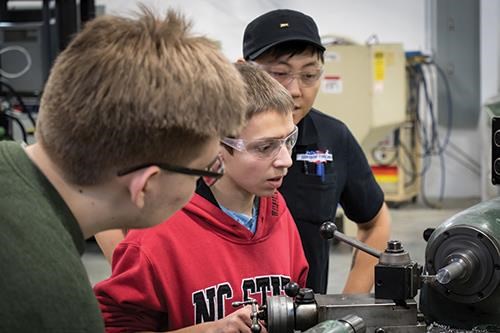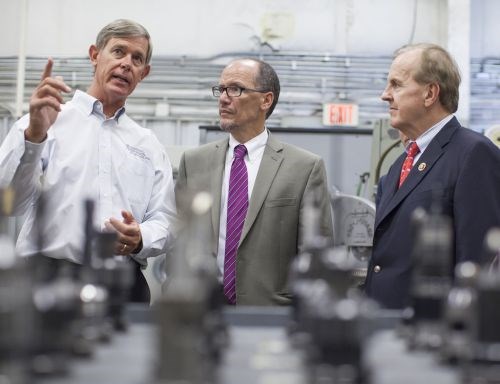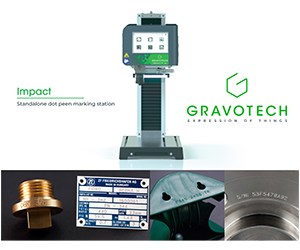Apprenticeship Model Expands in North Carolina
What’s good for the goose is good for the gander in this state, where established, European-style workforce development programs play a critical advisory role for brand new ones.

This photo was taken by Todd Schuett of Creative Technology Corp. during Superior Tooling’s NCTAP orientation session back in March. The program’s stringent application process weeds out all but the most promising applicants before any commitment is made.
A press release from Schunk recently caught my eye, but it didn’t have anything to do with the Morrisville, North Carolina, company’s workholding technology. Rather, it highlighted the critical leadership role that established workforce development programs have played in getting similar, brand new initiatives off the ground. As detailed in the press release, that role was recognized in a November 5 ceremony by the North Carolina Department of Commerce and Governor Pat McCrory, who also announced the state’s participation in the first annual Apprenticeship Week.
In my view, the programs the Governor praised deserve all the recognition they can get. I’ve been keeping an eye on apprenticeships in North Carolina for close to two years now, having been exposed to two programs during my time as an editor for MoldMaking Technology, a sister publication of Modern Machine Shop. The one that Schunk is part of, the North Carolina Triangle Apprenticeship Program (NCTAP), covers the state’s Triangle region (bounded by Raleigh, Durham and Chapel Hill). This MMT article covers how NCTAP works by highlighting the experience of another partner, mold manufacturer Superior Tooling, through the first half of 2014, the program’s first year of operation.
Back then, NCTAP was the program benefitting from the guidance of its peers. The program is based heavily on Apprenticeship 2000, a Charlotte-area initiative that’s been providing a steady stream of fresh talent for partners since 1998. (A case in point is founding member Ameritech Die & Mold, which has an extremely young staff—company president Steve Rotman once told me that “Our average age is probably between 28 and 30”). Apprenticeship 2000, in turn, is based heavily on a workforce development model that’s been in place in countries like Germany and Switzerland since the middle ages. As detailed in the MMT article link above, its guidance was critical to getting NCTAP off the ground.

Apprenticeship 2000 has attracted attention from the highest levels of government. Here, Ameritech President Steve Rotman (left) confers with U.S. Labor Secretary Thomas Perez (center) and U.S. Rep. Robert Pittenger during the two officials’ visit this past summer. (Image courtesy of US Department of Labor, Public Affairs.)
It seems fitting that, two years later, NCTAP members are standing alongside their Apprenticeship 2000 colleagues to similarly guide two more newly-launched programs (hence the aforementioned ceremony, which also recognized Apprenticeship Catawba and Siemens Charlotte for their leadership roles). Judging from the websites of the two new programs, the Guilford Apprenticeship Partners program in Guildford County and the Career Accelerator Program in Alamance County, these fledgling organizations will follow very similar models. With a path already laid before them by NCTAP and Apprenticeship 2000, I have no doubt that these new programs will enjoy similar success.
Related Content
-
Top Shop Builds Upon Employee Ownership for Future Success
In its quest to become the Fox Valley’s best-in-class employer, A to Z Machine has adopted an ESOP, expanded benefits and invested in apprenticeships.
-
If the Federal Government Is to Solve the Manufacturing Labor Shortage, it Needs to Start Here
Student-run businesses focused on technical training for the trades are taking root across the U.S. Can we — should we — leverage their regional successes into a nationwide platform?
-
When Handing Down the Family Machine Shop is as Complex as a Swiss-Turned Part
The transition into Swiss-type machining at Deking Screw Products required more than just a shift in production operations. It required a new mindset and a new way of running the family-owned business. Hardest of all, it required that one generation let go, and allow a new one to step in.













